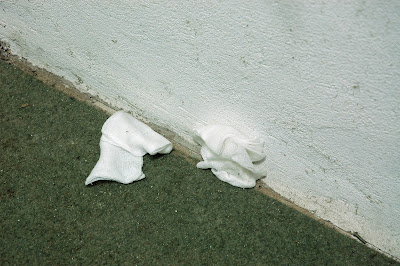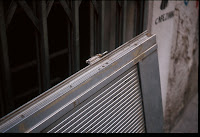-------------------------------------------------------------------------------------------
PORTA, 15th October 2010
I removed the door of a space at Rua Dos Caldeireiros 77 in Oporto , Portugal
In the first hours the space suffered some changes. Drawings started to appear on the wall. Militão, a junky from the neighborhood, started leaving drawings on the wall during the two nights, and two persons went into the last room, closed the room’s door and turned off the lights of the back part of the space, leaving only the lights of the entrance on. We didn’t intervene. The day after there was a strong smell: a mixture of strong human transpiration, crack and humidity. Also, two cardboards used as beds, a bottle of beer, a can, cotton, bandages, cigarette butts, etc.
The last hours we documented on video from the inside of the space and the outside. Many people passed by estranged, probably wondering when we would get out and leave.
Since the beginning, the sense of responsibility assaulted my friends, thinking about the probability of danger. I tried to convince them to leave the space without the door. I persuaded them. On the second night I couldn’t persuade them any longer. We put the door back.
If the conception of space has been a proper territory of mathematicians and metaphysics, I strongly believe that first of all it is configured by a theft, that of private property. Any space is private property before any abstract definition of it, albeit private being in a first moment an abstraction. This abstraction defines further our belief and sense of responsibility. We were preoccupied for what could happen to the space and the people living in the upper stories.
The junkies occupying it were only a possibility of many, a potentiality of potentialities.
Changing the configuration of the space by removing the door had as a premise the space as a plateau of immanence where diverse affections could transit. In this sense this space becomes a monitor for what Our Space has produced: Private Property, a moral that serves it, and its margins.
JUAN PABLO MACIAS
PORTA, 15 Octubre 2010
Removí la puerta de entrada de un espacio en Rua Dos Caldeireiros 77 en Oporto, Portugal. Se quedó abierto sin vigilancia y sin seguridad por 48 horas. Mauro Cerqueira, André Sousa y yo, pasamos caminando cada treinta minutos durante el tiempo de la acción. Documenté con diapositivas de 35mm y dibujos; André Sousa y Pedro Magalhaes, con video y fotografía digital.
El espacio sufrió cambios las primeras horas. Militão, drogadicto del barrio, empezó a dejar dibujos sobre la pared. Dos personas usaron el último cuarto para dormir, cerraron la puerta del cuarto, apagaron las luces de la parte trasera del espacio, dejando encendidas sólo las luces de entrada. No intervenimos. Al día siguiente había un olor fuerte, una mezcla de sudor, crack y humedad. Sobre el piso, dos cartones utilizados como cama, una botella de cerveza, una lata de refresco, algodón, vendas, colillas de cigarro y manchas sobre la pared.
Las últimas horas documentamos con video desde el interior del espacio y desde la calle. Varias personas pasaron extrañadas, talvez preguntándose cuando dejaríamos el lugar.
Desde el principio, el sentido de responsabilidad asaltó a mis amigos, pensaban sobre posibles peligros. Los persuadí para seguir adelante. La segunda noche no pude persuadirlos más. Regresamos la puerta a su lugar.
Si la concepción de espacio ha sido un territorio propio de matemáticos y metafísicos, creo firmemente, que el espacio esta fuertemente configurado por un robo inicial, aquel de la propiedad privada. Cualquier espacio es propiedad privada antes que una definición abstracta, no obstante privado indique una abstracción primera. Esta abstracción determina nuestras creencias y sentido de responsabilidad.
Cambiar la configuración del espacio mediante la remoción de la puerta, tenía como premisa el espacio como un plano de intensidades – de producción y registro – donde diferentes afectos podrían transitar. Este espacio deviene un registro, un monitor, una pantalla, para lo que nuestra lógica ha producido: Propiedad Privada, una moral que le sirve, y lo que mantiene al margen.

















































































